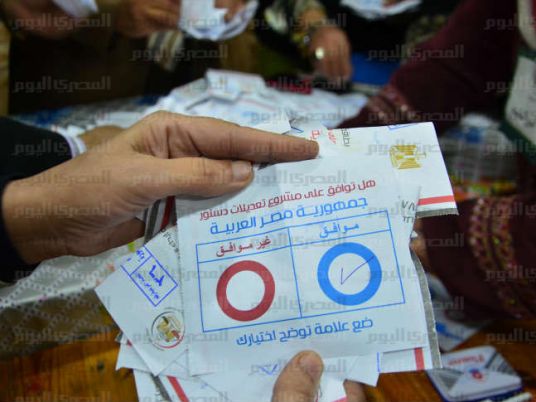
In the last couple months preceding the referendum, countless Egyptian media outlets began a widespread campaign to push viewers to vote for the 2013 Constitution, while political dissidents were seemingly swept under the rug, raising serious issues over the professionalism in the main-stream Egyptian media.
On TVs across Egypt, viewers saw a logo on the left corner of the screen inscribed with “Yes to the Constitution,” which was a normal occurrence on most satellite channels like Al-Kahera Wal-Nass and Cairo Cinema.
Both public and private channels bombarded viewers around the clock with advertisements featuring reports of famous celebrities and songs supporting the Constitution and telling people you “must say ‘yes’ [to the Constitution] to support your country going forward."
Some initiatives were launched to boycott the Constitution, such as the anti-coup alliance, but media did not shed much light on their campaign.
The vote “yes” campaign, however, operating openly with some anchors even urging viewers to support the Constitution during their TV programs.
During his show, TV presenter Ibrahim Eissa told viewers, “Vote ‘yes’ for the Constitution because it is a referendum on the future of Egypt, on the 30 June, on the end of the Muslim Brotherhood and on confronting the Americans.”
Presenter Ahmed Mousa fiercely said people must gather to vote “yes” for the Constitution in order to challenge Muslim Brotherhood wishes to see the lowest number of voters possible to prove to the whole world that it is a “coup” rather than a revolution.
“Millions took to the streets on 30 June to overthrow the criminal and terrorist Brotherhood rule, and they insisted on 29 July that General Abdel Fatah Al-Sisi be given a mandate to fight terrorism. It is time to move forward,” said Mousa loudly during one of his talk show episodes on the privately-owned Al-Tahrir satellite channel.
He continued, “We should say ‘yes’ for the country’s sake and to topple the terrorists. But people who say ‘no’ want the MB rule to come back.”
The well known columnist Nabil Farouk also wrote in Al-Tahrir newspaper a complete article of a word repeated along the article which is “yes” to constitution.
Unlike the TV, the national radio played another role. It broadcasted promotions in many languages, including Arabic, English and French, to raise awareness of the new constitution and encourage participation in the referendum.
While all these pro-Constitution campaigns roared, little attention seemed to be paid to people against the Constitution. Many of those that did try to create a campaign were ignored or silenced.
The Strong Egypt Party launched a campaign to say “no” to the draft Constitution, but at least seven people were arrested that same day merely for hanging posters urging a “no” vote.
In an article titled “Activists Arrested for ‘No’ Campaign,” Human Rights Watch reported “repression intensifies ahead of constitutional referendum” and “harshly condemned the arrest of the activists.”
“Egyptian citizens should be free to vote for or against the new constitution, not fear arrest for simply campaigning for a ‘no’ vote,” said the Middle East and North Africa deputy director, Joe Stork.
Is this professional?
The unified message across Egyptian media outlets to encourage viewers to vote “yes” raises the question whether the campaign was deliberate or merely a coincidence, and if it was deliberate, is this professional?
“Actually, our staff received an official statement telling us not to pay much attention to the Muslim Brotherhood's calls to boycott the Constitution and that we should instead focus more on people who support the document,” said a scriptwriter at a well-known, privately owned satellite channel speaking on condition of anonymity.
The source added that most activists or well-known experts who opposed the current situation and whose faces people had grown accustomed to seeing on TV were now either imprisoned or had fled the country.
Sohier Osman, a journalism professor at the Faculty of Mass Communication in Cairo University, condemned “Egyptian media unprofessionalism.” She explained that many talk shows allege that they hosted many sources to assure “objectivity” but claimed that this is unprofessional because there must be variety in picking the sources to express more “diverse" opinions.
“There has not been a robust discussion about the pros and cons of the document (the Constitution) before the vote in the media or rather, there have been many discussions about the pros of it,” said H. A. Hellyer, a Cairo-based specialist on Arab affairs and relations between the Muslim world and the West, in an opinion article on Al-Arabeya website.
Hellyer added that there have not been many discussions about the cons of the document. He said that “there have probably been more discussions about what has happened to people who argued against the Constitution.”
Minister of Mass Media Doria Sharaf al-Din defended the pro-Constitution push by the media, saying journalists are doing their “national job to support the people's right to know the articles of the Constitution and clarify their meanings.”
Sharaf al-Din asserted that “the Egyptian people, who amazed the world in its 30 June and 25 January revolutions, will come out to vote for the Constitution to assure the world that they can exercise their democratic right with the utmost freedom and that Egypt is able to complete the reconstruction of the state institutions to get Egypt through this critical point.”
Many analysts voice scepticism of this view. “I think it’s hard to say whether the media is balanced or biased, because balanced means that there is a fair presentation of different views which didn't happen,” said Ramy Raoof, blogger and social media expert.
Raoof believes the whole political scene was directing the media to follow a certain trend through various tactics, such as using their fear of being detained, losing their audiences and incurring the military’s anger.
“So [the media] supports a specific vote through many direct and indirect ways, leaving no space for other views to be presented and interacted in a fair and equal manner,” he noted.
In media research studies there is a well-known theory called the “framing theory” which suggests that how something is presented, or the “frame,” influences the choices that people make. Framing is the quality of communication that leads others to accept one meaning over another.
The domestic media has framed the discussion on the Constitution by portraying supporters as “loyalists,” while the opponents are “traitors.”
"Professionally speaking, according to the Journalism code of ethics, reporters or media practioners should not express their personal views or affiliations in their news writing which should be balanced and objective,” said media professor Enas Abo Youssef.
“We do not have balanced, objective media in Egypt. All media is completely biased due to ownership. Moreover in our society, the concept of media objectivity is absent,” Osman pointed out.
“For instance, yesterday Al-Hayah TV satellite channel, privately owned by Al-Wafd party head Al-Sayed Al-Badawy, aired a speech of himself to argue people into backing the Constitution,” Osman said in January.
Osman also noted that during Morsy’s rule, Islamic satellite channels and Al Jazeera were urging people to vote “yes,” conflicting with liberal TV channels who fought the 2012 Constitution tooth and nail, but at least there was a “variety of opinions.”
“But now the Islamist TV channels are closed and people only hear monotone speeches,” Osman said.
The same day the military overthrew Morsy, Al-Hafez, Alnas and other channels were also closed, claiming that this move was taken to prevent violence and hatred against the state, according to Armed Forces spokesman Ahmed Ali.
Osman added that TV shows usually target low-educated or illiterate populations and that they indeed play a big role in shaping their minds and opinions whether negatively or positively.
“Doubtlessly, I am against any kind of violence but actually the TV channels are spreading messages of hate and claiming a ‘no’ vote [against the Constitution] is betrayal and people should say ‘yes’ to fight our enemies,” commented Abo Youssef.
Abo Youssef added what is happening currently in the Egyptian media is a violation of both the journalism code of ethics and human rights.
“It is mobilization. Media reporters and presenters are asking people about how they will vote and this is a complete violation of personal privacy. In foreign countries, people are never asked about their opinion either before or after the referendum,” she said.
“The media coverage is completely biased and the news turned into ‘commodities’ that serve the ownership’s affiliations and interests. For instance, the liberal channels said the poll commissions are overcrowded, but Al Jazeera, which is well-known for its affiliation to the Muslim Brotherhood, said the number of voters was insignificant,” she said.
Abo Youssef emphasized that the “media chaos” is a result of the absence of a “media professionals syndicate” that could regulate the code of ethics.
Abo Youssef said that the majority of people who rushed to the referendum to vote ‘yes’ or ‘no’ is not due to the media’s endorsement or criticism of the actual document’s articles but for political reasons.




